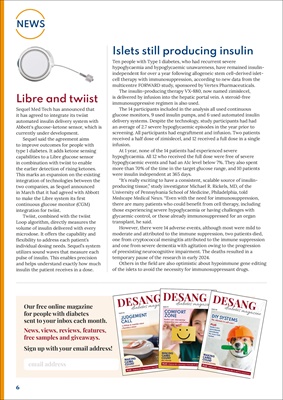
6
NEWS
Libre and twiist
Sequel Med Tech has announced that
it has agreed to integrate its twiist
automated insulin delivery system with
Abbott's glucose-ketone sensor, which is
currently under development.
Sequel said the agreement aims
to improve outcomes for people with
type 1 diabetes. It adds ketone sensing
capabilities to a Libre glucose sensor
in combination with twiist to enable
the earlier detection of rising ketones.
This marks an expansion on the existing
integration of technologies between the
two companies, as Sequel announced
in March that it had agreed with Abbott
to make the Libre system its first
continuous glucose monitor (CGM)
integration for twiist.
Twiist, combined with the twiist
Loop algorithm, directly measures the
volume of insulin delivered with every
microdose. It offers the capability and
flexibility to address each patient's
individual dosing needs. Sequel's system
utilizes sound waves that measure each
pulse of insulin. This enables precision
and helps understand exactly how much
insulin the patient receives in a dose.
Islets still producing insulin
Ten people with Type 1 diabetes, who had recurrent severe
hypoglycaemia and hypoglycaemic unawareness, have remained insulinindependent
for over a year following allogeneic stem cell-derived isletcell
therapy with immunosuppression, according to new data from the
multicentre FORWARD study, sponsored by Vertex Pharmaceuticals.
The insulin-producing therapy VX-880, now named zimislecel,
is delivered by infusion into the hepatic portal vein. A steroid-free
immunosuppressive regimen is also used.
The 14 participants included in the analysis all used continuous
glucose monitors, 9 used insulin pumps, and 6 used automated insulin
delivery systems. Despite the technology, study participants had had
an average of 2.7 severe hypoglycaemic episodes in the year prior to
screening. All participants had engraftment and infusion. Two patients
received a half dose of zimislecel, and 12 received a full dose in a single
infusion.
At 1 year, none of the 14 patients had experienced severe
hypoglycaemia. All 12 who received the full dose were free of severe
hypoglycaemic events and had an A1c level below 7%. They also spent
more than 70% of the time in the target glucose range, and 10 patients
were insulin independent at 365 days.
"It's really exciting to have a consistent, scalable source of insulinproducing
tissue," study investigator Michael R. Rickels, MD, of the
University of Pennsylvania School of Medicine, Philadelphia, told
Medscape Medical News. "Even with the need for immunosuppression,
there are many patients who could benefit from cell therapy, including
those experiencing severe hypoglycaemia or having challenges with
glycaemic control, or those already immunosuppressed for an organ
transplant, he said.
However, there were 14 adverse events, although most were mild to
moderate and attributed to the immune suppression, two patients died,
one from cryptococcal meningitis attributed to the immune suppression
and one from severe dementia with agitation owing to the progression
of preexisting neurocognitive impairment. The deaths resulted in a
temporary pause of the research in early 2024.
Others in the field are also optimistic about hypoimmune gene editing
of the islets to avoid the necessity for immunosuppressant drugs.
Our free online magazine
for people with diabetes
sent to your inbox each month.
News, views, reviews, features,
free samples and giveaways.
Sign up with your email address!
ISSUE 115
MAKING
CARBS
COUNT
MILK ALTERNATIVES
PLUS Diabetes kit • Giveaways • News (for T1 and T2) • Food News
JUDGEMENT
CALL
10 things to consider when
choosing a meter
PLUS
Who's Zooming who?
An update on digital
health delivery
ISSUE 111
MAKING
CARBS
COUNT
BELL PEPPERS
PLUS Diabetes kit • Giveaways • News (for T1 and T2) • Food News
COMFORT
ZONE
Roche's new micropump:
designed for user satisfaction
PLUS
Dexcom's next
generation G7 sensor ISSUE 119
MAKING
CARBS
COUNT
LUSCIOUS LYCHEES
PLUS Diabetes kit • Giveaways • News (for T1 and T2) • Food News
DIY SYSTEMS
The ultimate in self-care?
PLUS
Roche's new
meter launch:
introducing
the Accu-Chek
Instant
email address